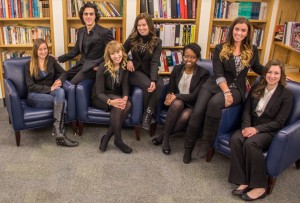Undergraduate Human Rights Program at St. Thomas University
St. Thomas University is a national leader in the study of Human Rights. Whereas many Human Rights programs are rooted in a single field of study, St. Thomas offers an integrated approach through the lens of social justice. Our students examine human rights with a multi-faceted liberal arts education, incorporating course options in Philosophy, Political Science, Economics, Sociology, Psychology, Criminology, Native Studies, Anthropology, and Religious Studies.
Discovering Human Rights
The Human Rights Program at St. Thomas is one of the few such programs in all of Canada, and the only one in Atlantic Canada, that allows undergraduate students to obtain a Major in the academic study of Human Rights. In this program, you study Human Rights in a national and international context and do individualized research projects on specific topics in your upper years of study. The program provides knowledge of the philosophy, legal instruments, and political institutions that are the foundation for an education in Human Rights.
Critical & Transferable Skills
As a student of Human Rights, you will develop advanced skills in critical analysis. You will be able to identify issues and have the capacity to work toward meaningful, reasonable solutions. Human Rights students are driven by a passion to understand and fight for necessary changes that make significant differences to individuals and to whole societies. They are able to see how decisions, events, and other actions affect people. They acquire the ability to navigate through legal and political realities to create a better world.
Common Careers and Graduate Pathways
Graduates from the Human Rights Program move on to pursue many areas of work and further study. Graduates often find themselves pursuing careers in journalism, humanitarian work, law, social work, politics, education, policing, and more.
Related Areas of Study
Students studying Human Rights are often interested in academic fields such as Criminology, Economics, History, Journalism, Political Science, and Sociology. These fields, like Human Rights, explore themes that deal with human nature, ethics, reasoning, behaviour, and the influences of history and government on societies and the individual.
First-Year Human Rights
A liberal arts education is about providing knowledge, intelligence, and experiences that are broad in scope and deeply informative. In first year, you will take introductory courses from five academic areas to ensure you are getting a well-rounded education. You will gain expert knowledge in your chosen field as you move through your degree. For additional information about the Human Rights Program at St. Thomas University click here or contact the Director of the Human Rights Program, Dr. Amanda DiPaolo at (506) 460-0330 or dipaolo@stu.ca.
Moot Court

St. Thomas students travelled to Fitchburg, Massachussets to compete in an international Moot Court competition.
Moot Court is the fastest growing experiential learning activity for undergraduate students today. Over 400 undergraduate teams compete across the United States in Moot Court. St. Thomas University’s Human Rights Program is proud to be able to offer this opportunity, the only one its kind in Canada.
The American Collegiate Moot Court Association puts on regional and national competitions where undergraduate students simulate appellate oral arguments before the Supreme Court of the United States in tournament format. What is interesting and unique about Moot Court is that these competitions use real case law as precedent, though the case each year in front of the Court is indeed fictitious though often loosely based on real laws.
To compete in Moot Court, students must enroll in Human Rights (HMRT) 3503. The moot court revolves around appellate arguments based on a hypothetical case concerning at least two constitutional issues. Students work in pairs and the students divide the legal issues between them. Students must prepare legal arguments for both petitioner and respondent for their issue(s). Students will learn the Supreme Court precedent surrounding the constitutional issues, practice their oral arguments in class and compete in regional (and hopefully national) competitions.
Moot Court is highly competitive and extremely selective. Each regional tournament limits the amount of teams that participate at competitions. Moot Court at STU is time consuming and will require you to put in hours and hours of weekly preparations. The course officially begins in the fall, but students are expected to do a lot of groundwork during the summer.
Contact
Amanda DiPaolo, PhD
Chair and Professor, Human Rights Department
St. Thomas University, Fredericton, NB E3B 5G3
Telephone: (506) 440-0313
Email:dipaolo@stu.ca
